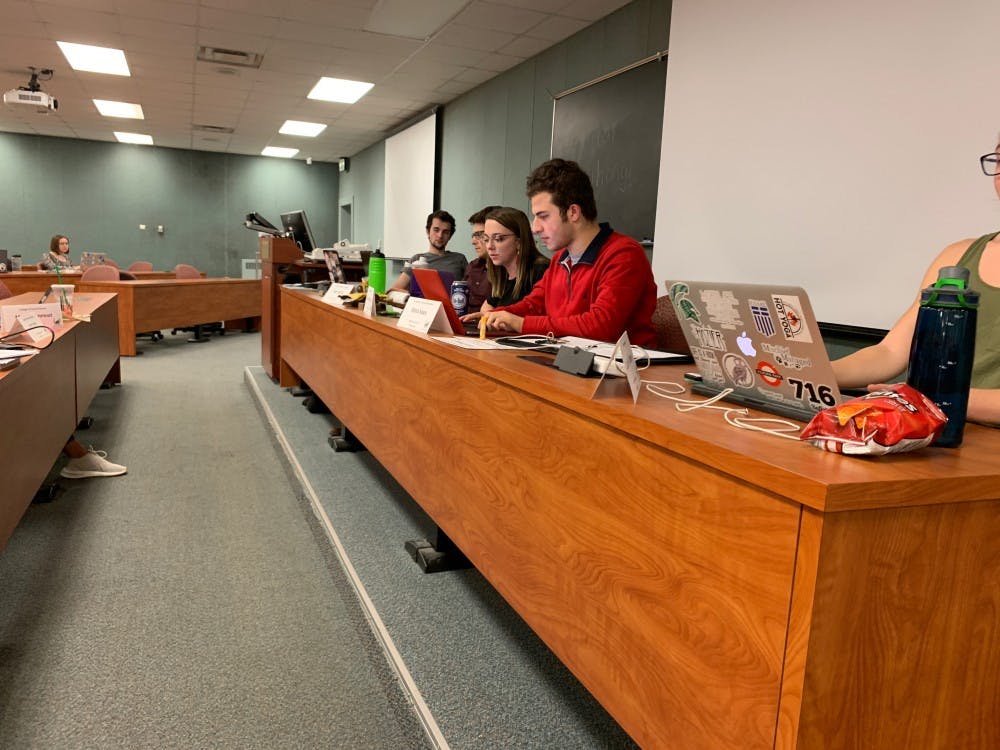The final General Assembly meeting of fall semester of the 55th session of the Associated Students of Michigan State University, or ASMSU, was held without President Katherine “Cookie” Rifiotis, who will return from her personal leave of absence on December 16.
The meeting was co-chaired by Vice President of Financial Operations and President Pro Tempore Dan Iancio and Vice President of Student Allocations Makenzie Bosworth.
Here are three initial takeaways from ASMSU's last General Assembly meeting of the fall 2018 semester.
Sitar elected to head Office of Governmental Affairs
The General Assembly elected Maysa Sitar, a representative from the College of Communication Arts and Sciences and current chair of the finance committee, as the new vice president of governmental affairs by a vote of 24 votes to 16.
Sitar will replace Eli Pales, who will not be on campus next semester.
The discussion and voting was held under a closed session, and The State News was not permitted to be in the room.
Sitar’s campaign speech focused on her experience level as a professorial assistant, member of the College Democrats, finance committee chair and secretary of the Association of Big Ten Students.
“As the chair of the finance committee this past semester, I have learned to act as an unbiased supervisor overseeing meetings, brainstorming sessions, and occasionally fiery disputes,” Sitar said in her speech. “I … have lobbied on behalf of student-specific interests at the state, local, and national level personally, from city council members to U.S. federal senators.”
She said she plans to focus on improving the relationship between the General Assembly and paid staff, as well as increasing student advocacy in legislative matters in the absence of major national elections during the remainder of her college career.
Sitar will abdicate her position as finance chair committee, as per ASMSU’s bylaws.
Showdown over advocating for voting rights expansions
Two bills were passed Thursday night concerning expanding voting rights to more members of the East Lansing community.
The first, Bill No. 55-23, allows the Office of Governmental Affairs — now headed by Sitar — to advocate at the state and local level to allow non-citizen residents of East Lansing to vote in municipal elections.
This bill was the subject of intense debate, with junior Sergei Kelley, a representative from the College of Agriculture, calling the bill a “slap in the face” to naturalized citizens such as himself — Kelley immigrated from Russia at a young age.
“It’s not American. You expand voting rights to essentially anyone, it really does crumble the country’s foundation. This is a pretty obvious argument … people who are here for maybe one to four years ... still having their voice affect things for eighty years when they go back to their country, and it’s just not right,” Kelley said.
Though Kelley’s voice was heard, he was outnumbered when it came to the vote. Ben Horne, a representative of the Lyman Briggs College, referred to non-citizen residents who pay income and property taxes as being subject to “taxation without representation.”
Policy committee chair and representative of the College of Music Isaiah Hawkins denounced Kelley’s argument.
“By similar logic to the idea that international students coming to East Lansing shouldn’t be able to vote in the East Lansing local elections because it won’t affect them (in the future) is the same logic (that says that) somebody who is studying right now shouldn’t be able to vote on the income tax because in two years they’re moving to Chicago,” he said. “So, why should they be able to vote if it’s not affecting them, correct? That logic doesn’t stand up to me.”
Bill No. 55-24 advocates for a change to the existing Michigan law that prohibits citizens under the age of 18 from voting.
Support student media!
Please consider donating to The State News and help fund the future of journalism.
This bill, which passed with less incident, allows the Office of Governmental Affairs to advocate for the state of Michigan to allow individual municipalities to decide the age they want people to acquire voting rights. If the Michigan law changes, the Office of Governmental Affairs will advocate for the City of East Lansing to lower the voting age to 17.
ASMSU wants Snyder to appear before former Trustee Perles' replacement is appointed
Another bill passed Thursday night calling for Governor Rick Snyder to hold a town hall on campus looking for students’ input in replacing recently retired Trustee George Perles. Snyder has previously stated that he will not seek outside or student input, as there is no precedent for such action.
Kelley did not support the bill, characterizing it as partisan. Snyder is a Republican and is expected to appoint a Republican nominee to replace Perles, a Democrat.
“So I think it comes down to a matter of … do we think the governor can do his job adequately,” Kelley said. “It might not be the decision we completely want, but is it something we can trust enough? Obviously, if this was (Governor-elect Democrat Gretchen) Whitmer doing it, there wouldn’t be any need for her to come see the students.”
The bill eventually passed, with Uzair Bandagi from the Muslim Students Association leading the charge.
“This is really not about politics. It doesn’t matter to me if it were Gretchen Whitmer, a Democrat, or a Libertarian, it really does not matter,” Bandagi said. “The bare minimum I ask as an American is that elected officials listen to their constituents. That’s just how it should be. Even if this has never been done before, even if (Snyder) has never held a town hall on an appointment, why can’t we as MSU students be the ones to change that and try to set a new precedent?”
Discussion
Share and discuss “Initial takeaways from ASMSU's final meeting of fall semester” on social media.








